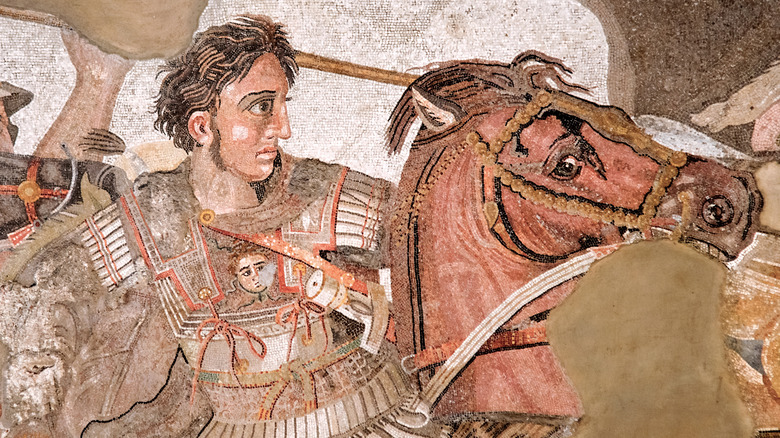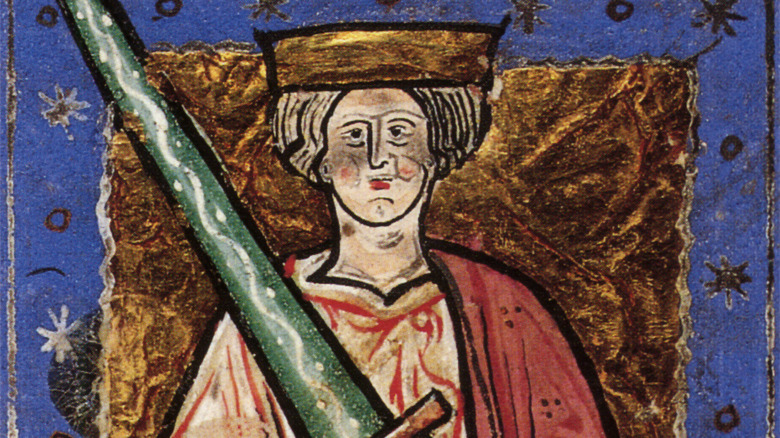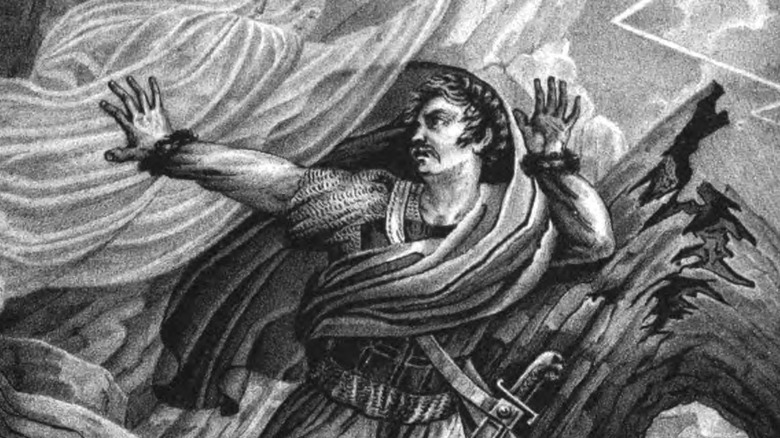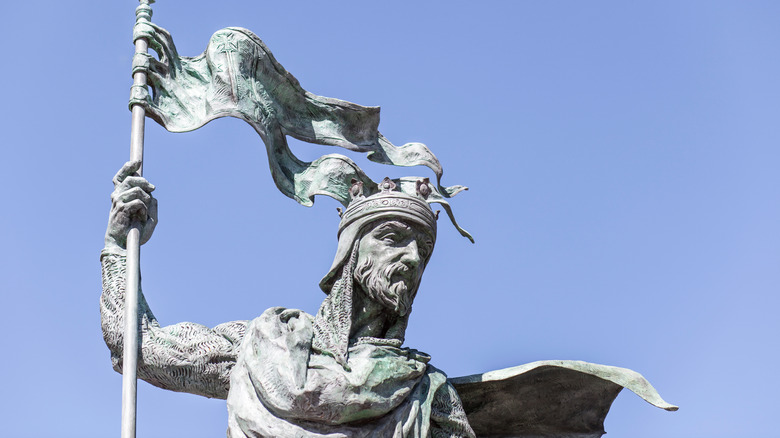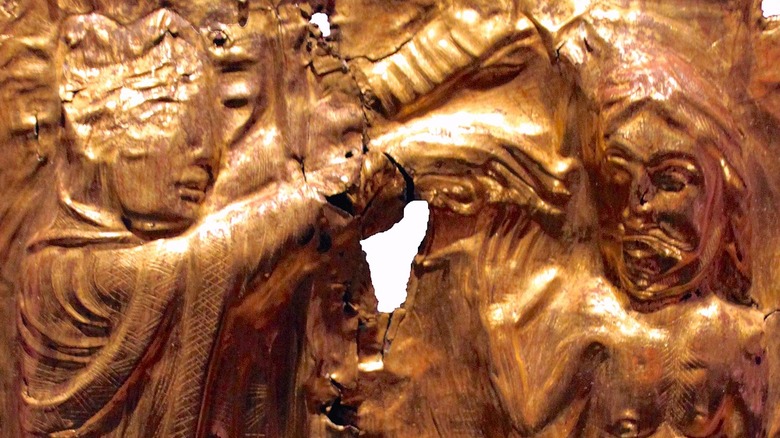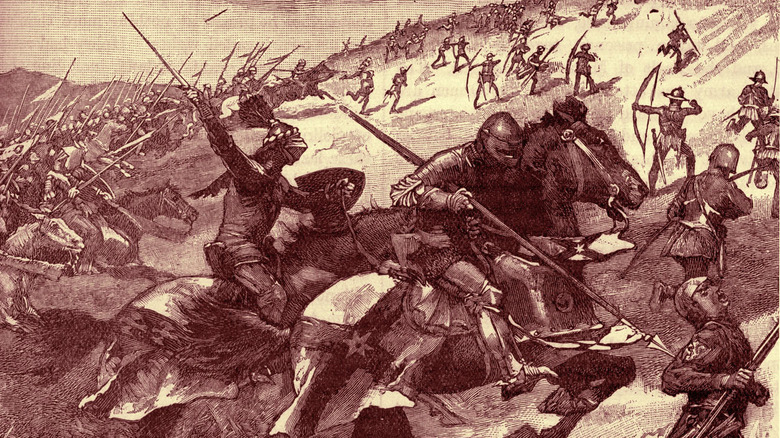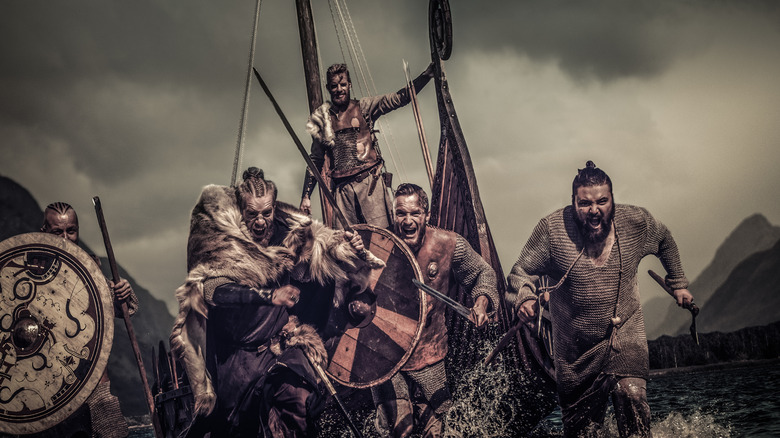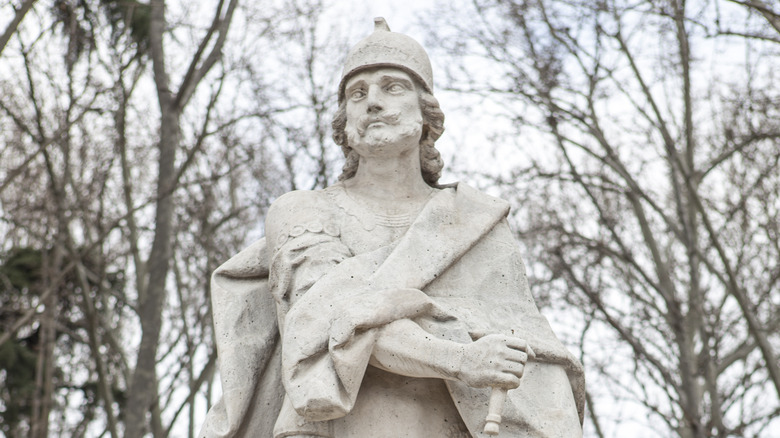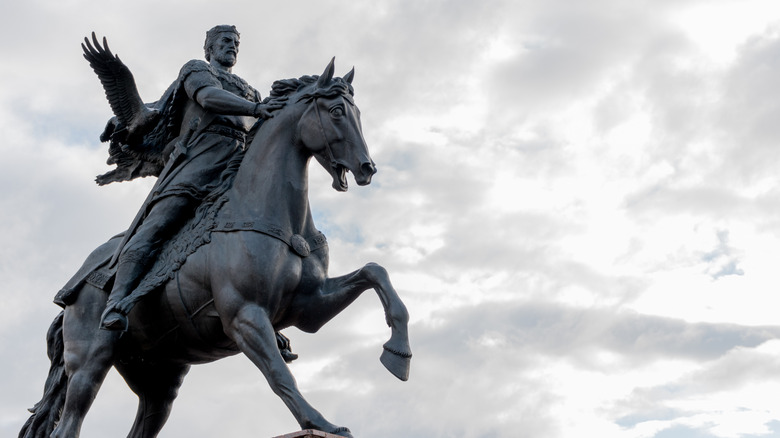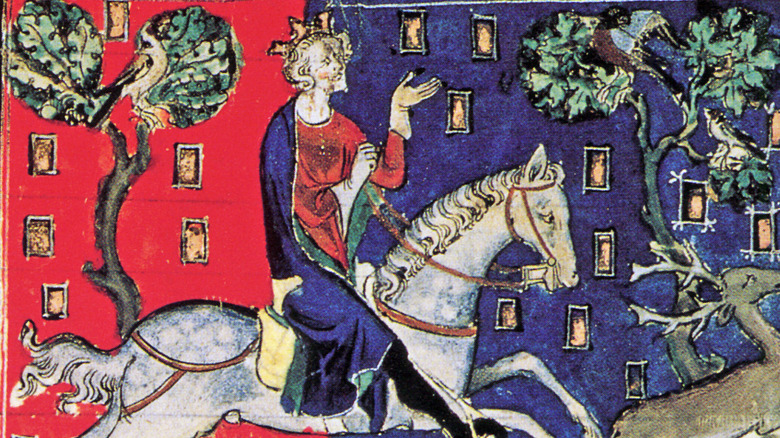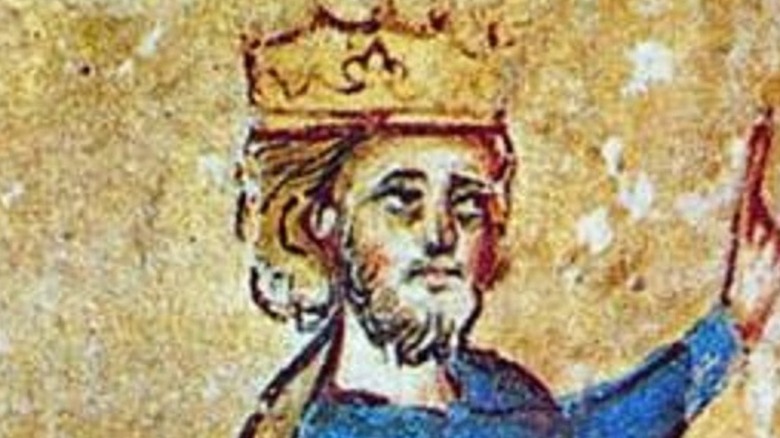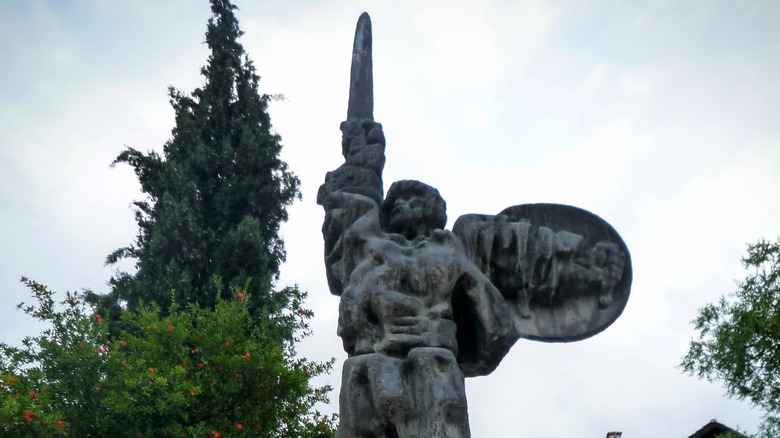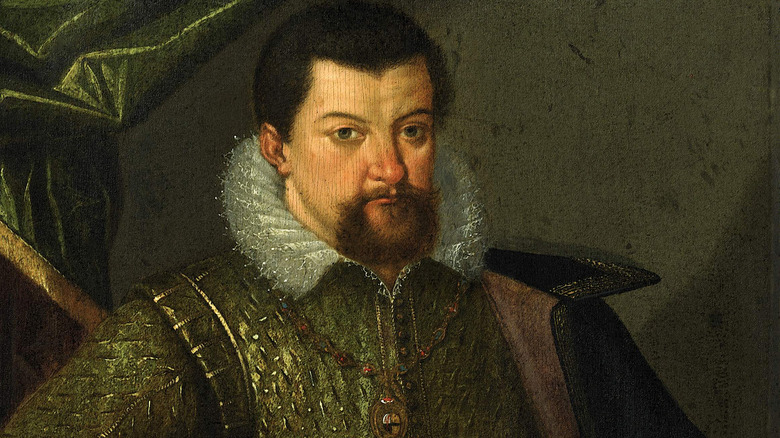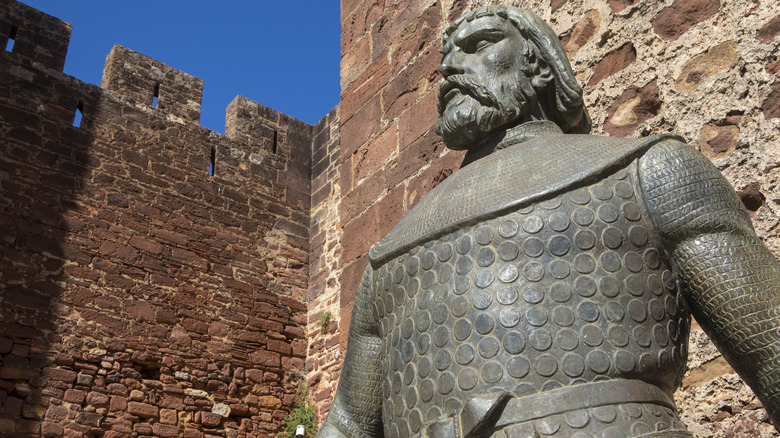History's Strangest Nicknames Explained
The nice thing about historical nicknames is that they you a little about the person in question — or at least tells you how people viewed themr. Think about Vlad the Impaler, the source of all Dracula lore or Alexander the Great, the famous conqueror. The nickname tells you that Vlad... well impaled his enemies. It also implies that he was just not a nice guy. Then anybody nicknamed "the Great" is usually a subject of some form of veneration, fascination, or at least recognition that they had a major impact.
Vlad and Alexander are just two well-known examples of historical nicknames. There are plenty of more obscure ones to choose from. For example, Alfonso XI of Castile was known as "the Avenger" — probably one of the coolest sobriquets around — and then there is John I of Aragon, who was known as "the Careless."
Obviously nicknames abound in history and some are stranger than others. Here are some of history's strangest nicknames and the stories connected to them. Let's start with a journal to medieval England.
Æthelred the Unready
One of the most ignominiously titled English monarchs is Æthelred the Unready. According to Britannica, Æthelred II (also spelled Ethelred), became king of England in 978. When he took power there was a shadow upon the new king since his half-brother, King Edward, had been murdered. Many suspected that Æthelred had something to do with it. There was a fair amount of disunity in England too, which meant that when the Danes invaded in 980 there was little that Æthelred could do except to try to pay them to go away.
The attempt at appeasement backfired. The Danes kept taking over. Æthelred then tried to murder the settlers in 1002, but this just instigated the Danes to send more warriors. Æthelred had so mismanaged the realm that in 1013 he was deposed in favor of the Danish king Sweyn I. To the English, the Danes seemed preferable to Æthelred.
However, Sweyn died the next year, so Æthelred was invited back on the condition that he addressed the country's grievances. The king died in 1016 with England in tatters. Sweyn's son Canute took over the kingdom on his path to establish a superkingdom.
According to the Royal Household, Æthelred was called "Un-raed," which means "no-council." It was a play on the king's name, which according to the "Dictionary of British and Irish History" means "noble counsel." So Æthelred Unraed literally means, "noble counsel, no-council." This transmuted later into "unready" to demonstrate the haplessness of his reign.
Sviatopolk the Accursed
How do you earn a sobriquet like Accursed? How about by killing your siblings? In the 11th century, the Principality of Kiev was a chaotic, fratricidal mess. "A History of Russian Law" explains that after the death of Prince Vladimir in 1015, his son, Iaroslav, was set to inherit power. However, Iaroslav's brother, Sviatopolk, the Prince of Turov, happened to be the only sibling in Kiev when their father died. Being the man on the spot he usurped power for himself as the Prince of Kiev. Chaos ensued.
Sviatopolk's younger half brother, Boris, was urged by his own men to toss out the usurper. However, Boris refused, reportedly saying, "It is not for me to raise my hand against my elder brother." This pious statement, as reported by "Early Ukraine," did not prevent Sviatopolk from sending boyars (nobles) to assassinate Boris while he was at prayer. The boyars botched the job and when they brought the body back to Kiev, they found Boris was still alive and twitching. Sviatopolk then had a guard finish the job with a sword thrust through the heart. The prince did the same to his other half and full brothers, thus earning the nickname "the Accursed" or "the Damned." Sviatopolk was eventually challenged by one last half brother, Iaroslav, in a fratricidal war. It ended in 1019 with the Accursed's defeat in battle. He died from wounds while trying to escape.
Alfonso the Slobberer
King Fernando II of Leon and Galicia did not want his son, Alfonso, to become king. Nevertheless, the prince did become Alfonso IX in 1188. Perhaps Fernando II objected to either his son's fits of rage which, as "A Clash of Thrones" tells us, caused the king to foam at the mouth. This earned him the nickname Alfonso the Slobberer. Another theory, offered by "The Despot's Accomplice" asserts the king may have been epileptic. Either way, Britannica explains that Alfonso, who ruled until 1230, was a "forceful personality." He waged war against the neighboring Iberian kingdoms and even at one point allied with the Islamic Almohads against his rivals in the kingdom of Castille. This resulted in his excommunication by the Pope and his kingdom being placed under the interdict in which sacraments were not held.
Eventually Alfonso was forced to relent and, after getting back land lost to Castille, he waged war against the Almohads, winning several important battles in this stage of the Reconquista of Spain. Meanwhile, the Slobberer also made a contribution to the development of democracy. Upon taking power he assembled the first cortes, an assembly, to gain the support of his nobles. He agreed to constraints on his power and a set of laws. This created a feeling of shared responsibility for the kingdom and was perhaps the first modern form of a parliament.
Harald Bluetooth
One of the most influential Norse rulers of the Viking age was King Harald I of Denmark. Harald, who lived from about 910 to 987 is credited as being the first ruler to unite Denmark (via Britannica). Harald also conquered Norway and converted to Christianity along with his subjects. After his death, his son Sweyn I conquered England. Sweyn was followed by his own son, Canute, who established a Danish empire that encompassed much of Scandinavia and England.
Harald was nicknamed Blåtand, which literally means "bluetooth." Why bluetooth? The historical consensus as told by "The Vikings" is that Harald simply had a bad tooth that was a darker, bluish shade of color — think extreme tooth decay. However, there is an alternate theory based on the archaeological discovery of young male Viking remains that had furrows carved into their front teeth. It has been speculated that these may have been painted either for "erotic or warlike signaling, in which case Harald's would have been blue."
Harald Bluetooth has gained more fame in recent years since Bluetooth wireless technology has been named after him. Why? A Bluetooth exec was quoted as saying, "King Harald Bluetooth ... was famous for uniting Scandinavia just as we intended to unite the PC and cellular industries with a short-range wireless link." The Bluetooth symbol is the runic letter for Harald's name.
Archibald the Loser
According to Oxford Reference, Archibald, the fourth Earl of Douglas, was a powerful Scottish noble who lived from circa 1372 to 1424. During that time, there were ongoing wars between England and Scotland. As detailed by Britannica, Scotland's King James I was held prisoner as a young man. During this time, Archibald was one of three critical nobles who wielded great power in the country. According to the "Dictionary of National Biography," Archibald and the other magnates probably plotted to amass power, and he was even charged with assassinating the heir to the Scottish throne.
Archibald had a mixed track record on the battlefield. He had some success against the English king Henry IV. Then in 1402 he lost a major engagement, was wounded five times, and lost an eye. Then in 1403 he was again defeated at the Battle of Shrewsbury, where he was severely wounded and taken prisoner although he had been credited for great personal bravery. He was released from England in 1408 after a ransom was paid. Archibald then entered battle again in 1417, besieging and failing to take English towns. Further defeats followed until 1423, when he was killed at the Battle of Verneuil.
Archibald was called Tyneman, which means loser. As stated by the Dictionary of National Biography, "In Scottish history he received the by-name of 'Tyneman,' for he lost almost every engagement he took part in from Homildon to Verneuil."
Halfdan the Generous in Gold and Stingy of Food
In terms of straightforward but weird nicknames, very few can compare to the eighth century Norse king whose name in the "Saga Library" was in Old Norse Hálfdan hinn mildi ok hinn matarilli. This translates to "Halfdan the Generous and Stingy of Food" according to "Vikings". While the Norse had a habit of applying very direct nicknames to their rulers, there are very practical reasons for this one. Viking rulers were expected to be generous, and only bad rulers kept wealth to themselves.
One of the greatest titles a Norse ruler could be called was a bracelet giver, which was an expression of magnaminty that united a warlord to his warriors. Consider that the Norse war god Odin possessed a magic ring called Draupnir that reproduced itself. These rings could be given to Odin's warriors in recompense for their service. So too was a Norse ruler meant to be a giver. As for Halfdan, he was only half par. On the one hand he gave gold pennies instead of silver pennies to his followers, but alas, he didn't give them enough victuals.
Wilfred the Hairy
The founder of Catalonia is the semi-legendary Count Wilfred. According to "Authoring the Past," he ruled from 878 to 897 as the count of Barcelona and Narbonne. According to legend, Wilfred as a young exile had an affair with a Flemish countess. While the countess would not outright marry the young noble, she promised him the hand of her daughter if he could assure her that he would inherit Barcelona which was then being ruled by a usurper. To prove this, he returned to Barcelona in disguise, where his mother recognized him by the hair that covered his back, an inherited trait. Thus, Wilfred the Hairy is not an allusion or allegory. He was literally, a hairy guy.
This also convinced the barons of Barcelona, who recognized his likeness to his ancestors. He thus was able to marry the countess' daughter, win the backing of the Holy Roman Emperor, and become the Count of Barcelona. This, as explained by "The Struggle for Catalonia," established the House Barcelona. His coat of arms became the Catalan flag and Wilfred the Hairy has become an icon of Catalan nationalism.
Anund Jacob the Coal-Burner
The early rule of the kingdom of Sweden has a very scanty historical record, although it alludes to colorful characters. According to "Västgöta Laws," one of these figures was King Anund Jacob (sometimes called Edmund), who was nicknamed Kolbränna, meaning "coal-burner." He ruled Sweden from about 1022 to 1050 and being the second Christian king of the Swedes was titled "most christian majesty" according to "The Historians History of the World."
Anund Jacob was a fairly powerful regional king. As explained by "Sweden" he tried to maintain a balance of power against Canute, the powerful Danish king. The results are mixed — his fleet was destroyed by Canute, but he did manage to hold onto power until his death. This was a feat in itself considering the amount of warfare among the Scandinavian kingdoms at that time.
So how did Anund Jacob get the nickname Coal-Burner? Apparently the king decreed a rather harsh eye-for-an-eye law whereby if somebody damaged a neighbor's property then the violator's property would be burned for a remunerative value. A slight variation of this theme is provided by "An Introduction to English Politics," which simply states that lawbreakers were punished by having their goods burned equivalent to the harm that they caused.
Vseslav the Sorceror
The Principality of Polotsk was centered in today's Belarus during the Middle Ages. "A History of Belarus" explains that this state reached its greatest strength during the long reign of Prince Vseslav, from 1044 to 1101. The prince developed the state while simultaneously conquering neighboring territories and being in an almost constant state of war with the princes of Kiev. In fact, at one point he was captured and imprisoned in Kiev, but an internal revolt broke out, which placed him on Kiev's throne for several months.
Vselslav's enemies often attributed his successes to supernatural power. As a result, he earned the nickname Vseslav the Sorceror (via "The Emergence of Russia"). Legends were relegated to him. According to the Russian "Primary Chronicle," Vseslav was born "by enchantment, for when his mother bore him, there was a caul over his head, and the magicians bade his mother bind this caul upon him, that he might carry it with him the rest of his life. Vseslav accordingly bears it to this day, and for this reason he is pitiless in bloodshed." In some tales the sorceror was also said to turn into a werewolf. Vseslav's evil reputation is probably undeserved, being the result of years of Kievan propaganda.
John Softsword
King John of England came to the English throne in 1199. He is derided by historians as one of the worst monarchs in the history of the United Kingdom. According to the World History Encyclopedia, John was the youngest of four royal siblings. As such he was given no land by his father, King Henry II. Thus, his first nickname was John Lackland.
John fought with his brothers, including King Richard the Lionheart, and attempted to usurp power while Richard was on the Third Crusade. This rebellion was put down and Richard not only forgave John, but designated him heir. But when John became king, things started to go downhill. He alienated the French lords, who held his lands in northern France and John ended up losing much of that territory to France.
"Lives of England's Monarchs" explains that he earned his second nickname, John Softsword, as a result of his ineptness, and that the moniker was also an obvious blow at his masculinity. Aside from this, King John managed to alienate the Church so much that he was excommunicated. His kingdom was placed under interdict, meaning sacraments would not be given. He angered his nobles so much through cruelty and inability that they forced him to sign the Magna Carta which, in effect, limited his powers. Thus, modern democracy and limited government may have much to thank from this king. It is telling that since John Softsword's reign, there has never been a King John II of England.
Erik Klipping the Coin Clipper
Erik V of 13th century Denmark was in continual conflict with the nobility of his kingdom as well as the Church. According to "The Imperial Dictionary of Universal Biography," in 1282 he was forced by the diet at Nyborg to curtail his powers by agreeing to rule by the law. This charter, as explained by "The A to Z of Denmark" was the Danish equivalent of the Magna Carta. Unfortunately, this did not seem to settle the dispute since the king was murdered by a noble disguised as a monk. He was still a few years shy of 40.
Erik was called Klipping or Glipping. "The Historical Dictionary of Denmark" explains that this was in reference to how the king would clip off bits of coins. Literally it referred to "someone who could shear a sheep twice for extra money." This practice naturally devalued the coins while putting some silver into Erik's coffers. It probably did not help him in his relations with the nobility.
Ivaylo the Cabbage
Peasant uprisings during the Middle Ages in eastern Europe were almost universally unsuccessful, except for a notable exception in 1277 in Bulgaria. According to "Cumans and Tatars," this rebellion was led by an illiterate swineherd named Ivaylo, who led a powerful and successful fight against the Tatars in northeastern Bulgaria. These successes built Ivaylo's reputation up so that more people flocked to his banner, which threatened Tsar Konstantin Tikh, ruler of Bulgaria.
Ivaylo is named Lachanas in Greek sources, which is just a translation of his nickname of Cabbage or sometimes Lettuce, an allusion to his peasant origins. Ivaylo defeated Tsar Konstantin in battle, killing him, and after political machinations worthy of "Game of Thrones," he became the Tsar of Bulgaria in 1278. Meanwhile, the Cabbage showed adept military skill being able to defeat Byzantine armies fielded against him. However, the Cabbage's reign was short since the upper class boyars despised his peasant lineage. He was deposed in 1280 and executed.
John George Beer Jug
John George I was the Elector of Saxony from 1611 to 1656. This reign completely encompassed the Thirty Years War, and according to Britannica, much of his rule as the "foremost Lutheran prince" of Germany was taken up by this extremely complex struggle.
As described by "Down Beer Street" the Elector, while very strongly anti-Calvinist, was sympathetic toward the Catholic Hapsburgs and at first remained loyal to them as they were the Emperors of the Holy Roman Empire. That changed, however, in 1631, when he allied with the Swedes with whom he won a victory at the Battle of Breitenfeld against the Hapsburgs. He eventually emerged from the war with some modest territorial gains.
John George was widely known as an affable, functional alcoholic. His nickname according to "Gustavus Adolphus" was the "Beer King" or "Beer Jug." It was said, as reported by Britannica, that John George Beer Jug's overriding goal was "to drink his beer in peace." If this impacted his foreign policy decision making is unknown.
Sancho the Populator
Sancho I was the second king of Portugal, and he faced a problem shortly after he assumed the throne in 1185. This was due to wars with the Almohads, known as the Moors. "The Tourist in Portugal" tells how after a massive army of Almohads invaded in 1191, the kingdom suffered from plague and other diseases. This and subsequent wars led to vast depopulations in the kingdom. Therefore, Sancho set out to fix the problem, earning himself the nickname of "the Populator."
How does a Populator populate? First, Sancho did his duty personally. According to "A Clash of Thrones," he fathered 19 children himself. Since he couldn't hope that every Portuguese subject would be as virile as himself he invited foreigners to settle in his kingdom, particularly immigrants from Flanders and Burgundy. Britannica details how he sought the help of nobles and bishops with his efforts to repopulate his kingdom. To encourage this, he also granted large areas of land to religious orders such as the Knights Hospitaller and the Knights Templar.
